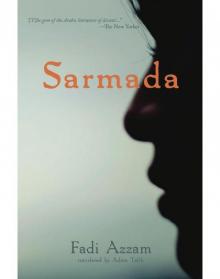- Home
- Fadi Azzam
Sarmada Page 22
Sarmada Read online
Page 22
At home, after a second bout of mourning and smelling his clothes, she broke the lock on the chest and took out the leaves of the book Al-Azif. She looked through it. She examined the drawings and symbols and letters and words. She felt as if the words were destroying her and she surged with anger. She took the sheets and used them to light a fire. The villagers tried desperately to put it out, but there was no use and the blaze and its fiery tongues burned all night, turning the house to ashes. There was no trace of her body. That fire was like a prophecy that would burn the place and usher it to its rebirth, although no one knew when. On that flaming night, the full Sarmadan moon glowed a fiery red, as if it were a keyhole or a magic eye through the heavenly gate.
The shaykh found he couldn't bear being married to Farida, not as if they were sister and brother at least, and so he ran away to the monastic isolation of the mountains to safeguard the oath he'd sworn to uphold. He wore himself out with hard labor and lashed his back with a whip that he'd made himself out of electrical cables, in the hope that pain and punishment would kill the desire he'd failed to suppress. Farida, for her part, locked herself up in the shed after the divorce.
She locked herself away just as her mother-in-law Umm Salman had done years before and her breasts began to grow larger and larger, transforming her suppressed desires into green breast milk. Then she suddenly had the realization that most of those special herbs that were prescribed to promote the production of breast milk and treat despair were nothing more than dried-up opium and poppy. She sliced her nipples open and out flowed blood mixed with the green milk, which she bottled and stored with her straw.
She devoted herself entirely to contemplation, silence, and prayer, and fell deep down into a well of forgetting until this very evening.
Salama found the bottles, brought them back to his house, and asked me what I thought he should do with them.
Today was the day I heard a voice announcing her death over the loudspeaker. The people of Sarmada ran over and improvised an abbreviated funeral but the shaykhs refused to pray over her body. I felt that I'd gotten Sarmada back and that I was finally finished with it, all in the same moment, and that it was time for me to leave.
I said goodbye to Salama without giving him an answer about the bottles of milk and was preparing to leave. I turned on my mobile and called my boss in Dubai to tell him that I'd be in Damascus by tomorrow and that I'd make up all the work I'd missed. I looked to see if there were any messages from Paris, but there weren't. I called Dr. Azza several times but her phone was turned off. I had the feeling that I never wanted to see her again, or even speak to her. I would just publish everything I'd recorded and send her a copy. There wasn't anything I could tell her.
Just as I was coming around to this surprising outcome, a stolid man with an artificial leg walked up. I swear to God he looked like Long John Silver from Treasure Island, the children's book. I nearly broke out in a smile as he got closer and it occurred to me that all he was missing was a parrot. As I studied him, I could see that he was an expert at ignoring questioning eyes. He was that rare breed of human being: dignified and mysterious, but spirited nonetheless.
He greeted Salama by name and then asked, “Where did you bury her?”
Salama pointed him in the direction of the grave, outside the village limits, and told the inscrutable stranger that he was planning to move the body to al-Manabi, Farida's hometown. The man left him and headed toward the shed.
Outside a crowd of villagers had gathered, in a quiet, curious circle, interrupted by repeated whispers: “It's Bulkhayr, Farida's son!”
He came out a little while later carrying an old, carefully knotted bundle and walked up to Salama. “Did you wrap her in a winding sheet?” he asked bitterly. Salama's head drooped sadly and he leaned down to pick up his shovel and walked off, without answering.
Bulkhayr unwrapped the bundle in front of the silent crowd and took out a wooden toy wrapped in old rags, a jar of kohl, a bottle of perfume, a toothbrush, a triangular amulet, perfumed soap and a neatly folded white veil. He unfolded the veil and held it up in front of the crowd. It was embroidered with colored buttons of different sizes, lined up all along its edges, and beneath each button, she'd sewn the name of its owner. Some were two-holed, others had four holes, sewn into the chaotic order of that bright white winding-sheet, which began to shine and glimmer in the fading sunlight. The voices began quietly at first, and then slowly grew louder and louder: “God rest her soul! God rest her soul! God rest her soul!”

 Sarmada
Sarmada